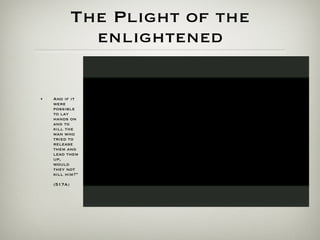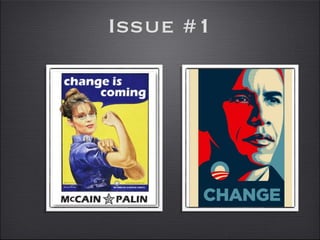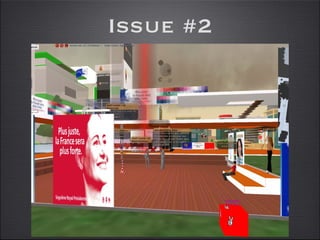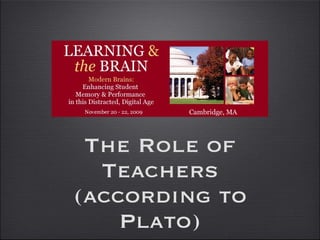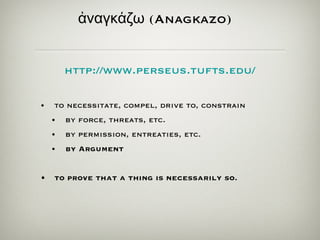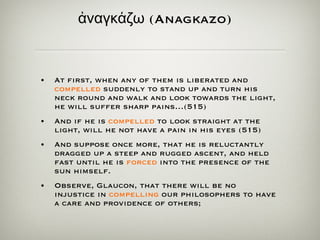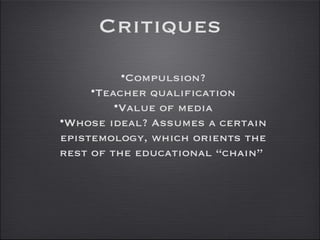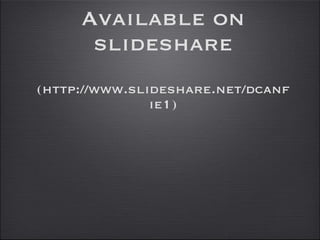Cave Presentation
- 1. PlatoÔÇÖs Allegory of The Republic, Book VII, 514-520 Douglas W. Canfield CS539 ÔÇö Fall 2009
- 2. PlatoÔÇÖs invitation ÔÇ£ NextÔÇØ, said I, ÔÇ£compare our nature in respect of education and its lack to such an experience as this.ÔÇØ
- 3. The Cave
- 4. Four (Five?) Levels Shadows Puppets Fire ÔÇ£ RealÔÇØ objects (via shadows / reflections) Sun (via moon) ÔÇ£ Absent PresenceÔÇØ Visible / Present ÔÇ£ The RealÔÇØ ( mediated ) From objects of thought to first principles, etc... ÔÇ£ The IdealÔÇØ, essence ( unmediated )
- 5. What is education? ÔÇ£ Then, if this is true, our view of these matters must be this, that education is not in reality what some people proclaim it to be in their professions.ÔÇØ (XXXX) ...this organ of knowledge must be turned around from the world of becoming together with the entire soul...until the soul is able to endure the contemplation of essence.ÔÇØ (XXXX)
- 6. The Need to Return ÔÇ£ It is the duty of us, the founders, then,ÔÇØ said I, ÔÇ£to compel the best natures to attain the knowledge which we pronounced the greatest...ÔÇØ (XXXX)
- 7. PlatoÔÇÖs Allegory in Popular Culture
- 8. Morpheus ( Greek : ╬£╬┐¤ü¤å╬¡╬▒¤é, ╬£╬┐¤ü¤å╬Á¤ì¤é , "he who forms, shapes, moulds", from the Greek morphe) Neo ( Greek : "new")
- 9. Inside the Cave ÔÇö Release from the cave ÔÇ£ Conceive them as having their legs and necks fettered from childhoodÔÇØ (514a) [W]hat do you suppose would be his answer if someone told him that what he had seen before was all a cheat and an illusion...? (515d)
- 10. What is ÔÇ£RealÔÇØ? ÔÇ£ [D]o you not think that ...he would regard what he formerly saw as more real than the things now pointed out to him?ÔÇØ (515D)
- 11. The Plight of the enlightened And if it were possible to lay hands on and to kill the man who tried to release them and lead them up, would they not kill him?ÔÇØ (517A)
- 12. Issue #1
- 13. Issue #2
- 14. The Role of Teachers (according to Plato)
- 15. ß╝Ç ╬¢╬▒╬│╬║ ߢ▒ ╬¤ë (Anagkazo) to necessitate, compel, drive to, constrain by force, threats, etc. by permission, entreaties, etc. by Argument to prove that a thing is necessarily so. http:// www.perseus.tufts.edu /
- 16. ß╝Ç ╬¢╬▒╬│╬║ ߢ▒ ╬¤ë (Anagkazo) At first, when any of them is liberated and compelled suddenly to stand up and turn his neck round and walk and look towards the light, he will suffer sharp painsÔǪ(515) And if he is compelled to look straight at the light, will he not have a pain in his eyes (515) And suppose once more, that he is reluctantly dragged up a steep and rugged ascent, and held fast until he is forced into the presence of the sun himself. Observe, Glaucon, that there will be no injustice in compelling our philosophers to have a care and providence of others;
- 17. Critiques Compulsion? Teacher qualification Value of media Whose ideal? Assumes a certain epistemology, which orients the rest of the educational ÔÇ£chainÔÇØ
- 18. Available on slideshare (http://www.slideshare.net/dcanfie1)

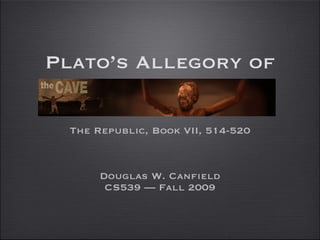
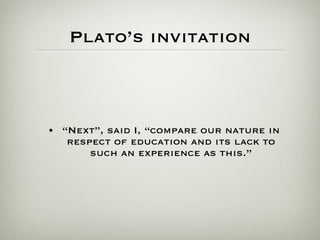
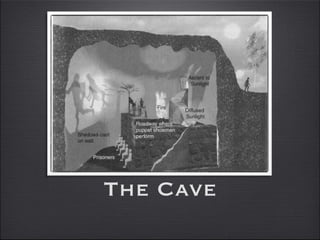
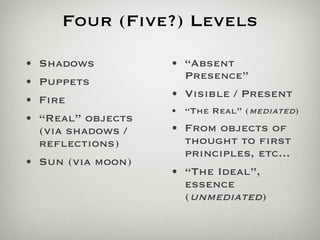
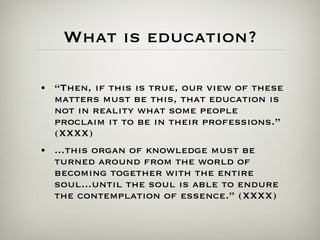
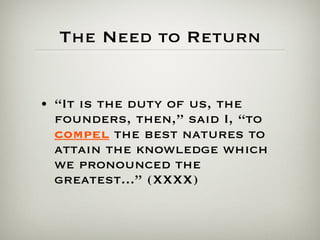
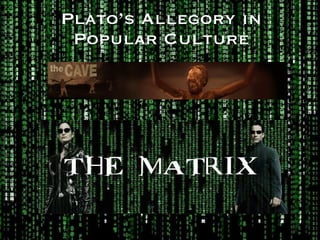
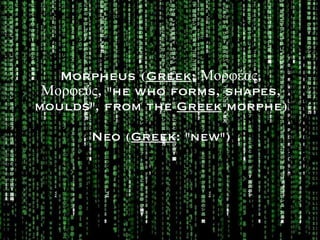
![Inside the Cave ÔÇö Release from the cave ÔÇ£ Conceive them as having their legs and necks fettered from childhoodÔÇØ (514a) [W]hat do you suppose would be his answer if someone told him that what he had seen before was all a cheat and an illusion...? (515d)](https://image.slidesharecdn.com/plato-090908163703-phpapp01/85/Cave-Presentation-9-320.jpg)
![What is ÔÇ£RealÔÇØ? ÔÇ£ [D]o you not think that ...he would regard what he formerly saw as more real than the things now pointed out to him?ÔÇØ (515D)](https://image.slidesharecdn.com/plato-090908163703-phpapp01/85/Cave-Presentation-10-320.jpg)
